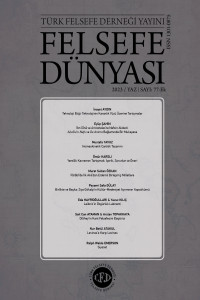Öz
Emmanuel Levinas çağdaş Fransız felsefesinin en önemli isimlerinden biridir. Onun düşüncesi neredeyse bütün bir Batı felsefesine meydan okur ve etiği ilk felsefe olarak kabul ederek ontoloji temelli, özne/bilinç merkezli felsefeyi karşısına alır. Bununla birlikte Levinas, yalnızca ontolojiyi “ilk felsefe” kabul eden bütün bir felsefe geleneğini eleştirmekle kalmaz aynı zamanda Batı felsefesi içerisinde geliştirilmiş bütün etiklere karşı da eleştirel bir tutum sergiler. Çünkü onun felsefesinde özne üzerinden kurulan bütün ahlak teorileri bir kenara bırakılarak, Başka ve Başka’nın yüzünde (suretinde) gün yüzüne çıkan buyruğun kuruculuğu vurgulanır. Etik belirli değerler hiyerarşisini, erdemlerin üstünlüğünü ya da yasayı yücelten bir felsefi uğraş olmaktan öte, öznenin tahakkümünü kıran, onu Başka karşısında güçsüz kılarak yeniden kuran temel uğraş olmaya yükselir. Başka’nın yüzünde, özneye seslenen buyruk “Öldürmeyeceksin!” diyerek özneyi Başka’nın bütün sorumluluğunu üstlenmeye davet eder. Levinas’ın asimetrik etiği ötekini düşünmek adına oldukça sarsıcıdır.
Bununla birlikte Levinas bir Talmud yorumcusudur. Felsefi eserleri ile Yahudilik ve Talmud üzerine kaleme aldığı eserlerini ayırsa ve hiçbir zaman felsefi yapıtlarında dini temellendirmelere başvurmasa da onun düşüncesinde Yahudiliğin etkilerini görmemek mümkün değildir. Bu ikili entelektüel kimlik Levinas’a dair önemli bir sorgulamayı da gündeme getirir: Başka’nın önceliğini savunan ve tüm felsefesini buradan hareketle kuran Levinas’ın İsrail devletinin kuruluşuna ve İsrail’in Başka’sı olan Filistin halkına karşı amansız tutumuna bakışı nasıldır? Burada bu sorunun yanıtını ararken Levinas’ın etiğini kadim bir sorunun ışığında test etmeye çalışacağız: Acaba teorik manada çok iyi bir biçimde kurgulanmış bir etik, pratik-ahlaki planda tam manasıyla karşılık bulabilir mi? Yoksa teori pratikle sınandığında başarısız olmaya mahkûm mudur?
Kaynakça
- Levinas, Emmanuel. Autrement qu’être ou au-delà de l’essence. Hollanda: Martinus Nijhoff, 1978.
- Levinas, Emmanuel. De dieu qui vient à l’idée, 2. Baskı, Paris: Librairie Philosophique J. Vrin, 1993.
- Levinas, Emmanuel. “La philosophie et l’idée de l’Infini”, Revue de Métaphysique et de Morale 62/3 (Eylül 1957): 241-253.
- Levinas, Emmanuel. Sonsuza Tanıklık. ed. Zeynep Direk, Erdem Gökyaran. İstanbul: Metis Yayınları, 2003.
- Levinas, Emmanuel. Zaman ve Başka. çev. Özkan Gözel. İstanbul: Metis Yayınları, 2005.
- Başaran, Melih…Ve Niçin (Yine) Felsefe... Yapıçözümler. İstanbul: Yapı Kredi Yayınları, 1993.
- Gözel, Özkan. Varlıktan Başka Levinas’ın Metafiziğine Giriş. İstanbul: İthaki Yayınları, 2011.
- Bernasconi, Robert. Levinas Okumaları. ed. Zeynep Direk. İstanbul: Pinhan Yayıncılık, 2011.
Öz
Emmanuel Levinas is one of the most important figures of contemporary French philosophy. His philosophy challenges almost the entire Western philosophy by rejecting ontology-based, subject-consciousness centered philosophy and considering ethics as the first philosophy. However, Levinas not only criticizes the entire philosophical tradition that accepts ontology as the "first philosophy," but also exhibits a critical attitude towards all ethics developed within Western philosophy. Because in his philosophy, all moral theories based on the subject are set aside, and the founding of the commandment that emerges in the Other and on the face of the Other is emphasized. Ethics, rather than being a philosophical endeavor that exalts a hierarchy of certain values, virtues, or laws, steps up to a higher level and becomes the fundamental endeavor that breaks the domination of the subject, and weakens it against the Other and rebuilds it. The commandment that addresses the subject in the face of the Other says, "Thou shalt not kill!", inviting the subject to take responsibility for the Other entirely. Levinas's asymmetric ethics is quite disturbing in terms of thinking about the other.
On the other hand, Levinas is a Talmud commentator. Although his philosophical works and works on Judaism and Talmud are distinguished and he never resorts to religious foundations in his philosophical works, it is impossible not to see the effects of Judaism in his thought. This dual intellectual identity also raises an important question about Levinas: What is Levinas's attitude towards the establishment of the State of Israel and his relentless attitude towards the Palestinian people who are the Other of Israel, given that he advocates the priority of the Other and bases all his philosophy on this? Here, while searching for the answer to this question, we will try to test Levinas's ethics in the light of an ancient question: Can an ethics that is theoretically well-constructed find full expression in practical-moral terms? Or is theory doomed to fail when tested by practice?
Kaynakça
- Levinas, Emmanuel. Autrement qu’être ou au-delà de l’essence. Hollanda: Martinus Nijhoff, 1978.
- Levinas, Emmanuel. De dieu qui vient à l’idée, 2. Baskı, Paris: Librairie Philosophique J. Vrin, 1993.
- Levinas, Emmanuel. “La philosophie et l’idée de l’Infini”, Revue de Métaphysique et de Morale 62/3 (Eylül 1957): 241-253.
- Levinas, Emmanuel. Sonsuza Tanıklık. ed. Zeynep Direk, Erdem Gökyaran. İstanbul: Metis Yayınları, 2003.
- Levinas, Emmanuel. Zaman ve Başka. çev. Özkan Gözel. İstanbul: Metis Yayınları, 2005.
- Başaran, Melih…Ve Niçin (Yine) Felsefe... Yapıçözümler. İstanbul: Yapı Kredi Yayınları, 1993.
- Gözel, Özkan. Varlıktan Başka Levinas’ın Metafiziğine Giriş. İstanbul: İthaki Yayınları, 2011.
- Bernasconi, Robert. Levinas Okumaları. ed. Zeynep Direk. İstanbul: Pinhan Yayıncılık, 2011.
Ayrıntılar
| Birincil Dil | Türkçe |
|---|---|
| Konular | Felsefe |
| Bölüm | BİLDİRİ |
| Yazarlar | |
| Yayımlanma Tarihi | 29 Ekim 2023 |
| Gönderilme Tarihi | 12 Nisan 2023 |
| Yayımlandığı Sayı | Yıl 2023 Sayı: 77 - EK |

